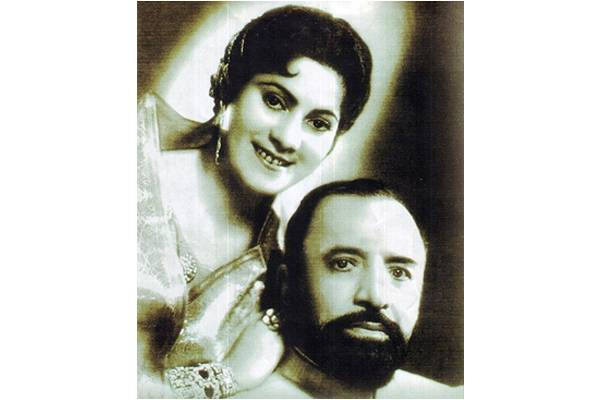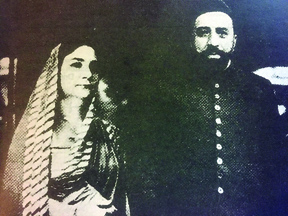
 Industrialist, social reformer and political figure Sir Abdullah Haroon pictured with his eldest daughter Doulat Haroon Hidayatullah and wife Nusrat (inset). Sir Abdullah Haroon is a towering figure in Sindh's history and his contributions to the creation of Pakistan are well documented. He was born in 1872 and his father died when he was four years old. A young Abdullah started out in the sugar business with just one bag and went on to open a small shop in Jodia bazaar, Karachi in 1899. By 1909, he owned property in Ranchore Lines and a residence on Victoria Road. His political career began with him contesting and winning a seat on the Municipal Committee of Karachi in 1913 and he extended his philanthropic largesse to many parts of the city. For example, he began to focus on Lyari, making contributions to building bathing ghats with drainage among other projects, starting what would be a relationship with this neighbourhood that ran through generations of the Haroon family. After a relatively unsuccessful first marriage, he married Nusrat, the daughter of an Indian doctor and an Iranian woman, in 1914. But he had to agonise over the choice as she was a Shia. For a while, he kept the marriage secret from his mother Hanifabai, a Memon, who he otherwise had an extremely close relationship with. Indeed, they ate their meals together till she passed away. Doulat (born 1915), pictured here, was the first child of his marriage to Nusrat, who was extremely dear to him. Indeed, he ignored threats of excommunication from the Memons of Karachi when the man who sought Doulat's hand did not belong to the community. She married Anwar Hussain Hidayatullah, the son of former chief minister of Sindh Ghulam Hussain Hidayatullah. The Cutchi Memons boycotted the wedding and no one was allowed to attend. Indeed, the Cutchi Memon Jamaat ostracised Sir Abdullah Haroon, who resigned. But happily, after a meeting, he was persuaded to withdraw his resignation. It is also noteworthy that Sir Abdullah Haroon, who was otherwise a proponent of purdah, firmly believed in educating women. Indeed, in 1915 he adopted the Muslim law of inheritance, departing from an old Cutchi Memon tradition of following Hindu customs as they had converted to Islam. This entitled his wives and daughters to their rightful share of inheritance. Many other Memons followed his example.
Industrialist, social reformer and political figure Sir Abdullah Haroon pictured with his eldest daughter Doulat Haroon Hidayatullah and wife Nusrat (inset). Sir Abdullah Haroon is a towering figure in Sindh's history and his contributions to the creation of Pakistan are well documented. He was born in 1872 and his father died when he was four years old. A young Abdullah started out in the sugar business with just one bag and went on to open a small shop in Jodia bazaar, Karachi in 1899. By 1909, he owned property in Ranchore Lines and a residence on Victoria Road. His political career began with him contesting and winning a seat on the Municipal Committee of Karachi in 1913 and he extended his philanthropic largesse to many parts of the city. For example, he began to focus on Lyari, making contributions to building bathing ghats with drainage among other projects, starting what would be a relationship with this neighbourhood that ran through generations of the Haroon family. After a relatively unsuccessful first marriage, he married Nusrat, the daughter of an Indian doctor and an Iranian woman, in 1914. But he had to agonise over the choice as she was a Shia. For a while, he kept the marriage secret from his mother Hanifabai, a Memon, who he otherwise had an extremely close relationship with. Indeed, they ate their meals together till she passed away. Doulat (born 1915), pictured here, was the first child of his marriage to Nusrat, who was extremely dear to him. Indeed, he ignored threats of excommunication from the Memons of Karachi when the man who sought Doulat's hand did not belong to the community. She married Anwar Hussain Hidayatullah, the son of former chief minister of Sindh Ghulam Hussain Hidayatullah. The Cutchi Memons boycotted the wedding and no one was allowed to attend. Indeed, the Cutchi Memon Jamaat ostracised Sir Abdullah Haroon, who resigned. But happily, after a meeting, he was persuaded to withdraw his resignation. It is also noteworthy that Sir Abdullah Haroon, who was otherwise a proponent of purdah, firmly believed in educating women. Indeed, in 1915 he adopted the Muslim law of inheritance, departing from an old Cutchi Memon tradition of following Hindu customs as they had converted to Islam. This entitled his wives and daughters to their rightful share of inheritance. Many other Memons followed his example. 
